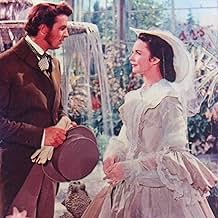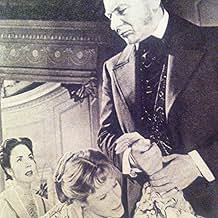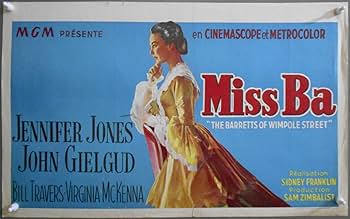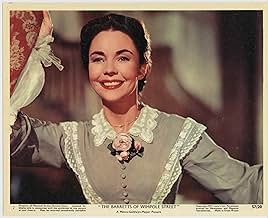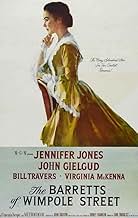Il grande amore di Elisabetta Barrett
Titolo originale: The Barretts of Wimpole Street
VALUTAZIONE IMDb
6,5/10
621
LA TUA VALUTAZIONE
Aggiungi una trama nella tua linguaElizabeth Barrett's tyrannical father has forbidden any of his family to marry. Nevertheless, Elizabeth falls in love with the poet Robert Browning.Elizabeth Barrett's tyrannical father has forbidden any of his family to marry. Nevertheless, Elizabeth falls in love with the poet Robert Browning.Elizabeth Barrett's tyrannical father has forbidden any of his family to marry. Nevertheless, Elizabeth falls in love with the poet Robert Browning.
- Regia
- Sceneggiatura
- Star
Christopher Cooke
- Minor Role
- (non citato nei titoli originali)
Recensioni in evidenza
Although not as engaging as the original play, This film adaptation of BARRETTS OF WIMPOLE ST is a very well made film. John Gielgud gives one of his finest screen performances as Edward Barrett, he is despicable yet worthy of pity. Jennifer Jones is strong as Elizabeth and her character unfolds beautifully before your eyes. The actors who play the clan of brothers nicely delineate each role so they are individuals and not a unit. this film does suffer a bit from the over emphasis on the elizabeth/browning relationship as opposed to the father/daughter one but I suppose this was the hollywood trend toward romance at the time.
Throughout this film, I kept thinking of Director Wm. Wyler's adaptation of Henry James's novel, with Olivia de Havilland in "The Heiress." What made that a better movie? was it the casting? the directing? the actor chemistry? or all of the above? Previous reviewers of "Barretts" all praised Gielgud's acting, but I wondered why he accepted the role, or could stand himself in it. I could barely view him on screen, so wooden, so inhuman was his incarnation of Moulton Barrett: this was not a person, it was a caricature. Compare, instead, Ralph Richardson's interpretation of a similar emotion-starved and pathologically driven father in his love for his daughter.
As for the casting of Bill Travers as Robert Browning, I felt he lacked any subtlety, any "poetry" in his manner, any semblance of an understanding of female psychology or charm, most of all, lacked any chemistry with Jones as Elizabeth. He seemed to be barking all of his lines as if he were on the football field. Can you imagine his role cast instead with, say David Farrar, or one of the Ealing Studio regulars? Fans of Jennifer Jones may still want to sit through this movie to see her conception of the poetess. But when we compare this role with her performance in, say, "Wild at Heart [Driven to Earth]," the great Powell-Pressburger film, or even "Madame Bovary," it falls far short of full realization. In those films, she revealed passion, coyness, charm and geniune fear, gripping us with the emotions of her predicament. As noted by another reviewer, here she appears far too healthy, even too mature (although that would be an accurate estimation of her actual age when she met Browning, according to her biography) to be believable. Of course we can accept some cinematic license -- we don't have to expect that Mimi should actually be consumptive in "La Boheme"--but Jones's conception confused strength of character with bodily health -- her fainting on the stairs was almost a joke, more a sign of her rare weakness as an actress. In fact, one actually felt more pity for her sister, as portrayed by Virginia McKenna, in a lively,deeply felt role, in which we feared for Henrietta's emotional health and future in that stifling household.
So, shall we lay the blame at the foot of the hapless director Sidney Franklin? All the settings, the costumes, even the lovely tune, beautifully sung by Jones at the piano should have offered the right support. The clumsiness of the production is almost encapsulated in that little scene around the piano: when Jennifer sings it (whether or not she herself indeed voiced it), there is lyricism and musicality, and one longs for her to continue, but everyone, namely her brothers, is urged to join in. None of them can really sing, they shout out the melody, drowning Elizabeth's soprano, and the whole scene, at least for this viewer, is ruined. Just like the movie.
Of a possible four ****, I give it my lowest rating one star*.
As for the casting of Bill Travers as Robert Browning, I felt he lacked any subtlety, any "poetry" in his manner, any semblance of an understanding of female psychology or charm, most of all, lacked any chemistry with Jones as Elizabeth. He seemed to be barking all of his lines as if he were on the football field. Can you imagine his role cast instead with, say David Farrar, or one of the Ealing Studio regulars? Fans of Jennifer Jones may still want to sit through this movie to see her conception of the poetess. But when we compare this role with her performance in, say, "Wild at Heart [Driven to Earth]," the great Powell-Pressburger film, or even "Madame Bovary," it falls far short of full realization. In those films, she revealed passion, coyness, charm and geniune fear, gripping us with the emotions of her predicament. As noted by another reviewer, here she appears far too healthy, even too mature (although that would be an accurate estimation of her actual age when she met Browning, according to her biography) to be believable. Of course we can accept some cinematic license -- we don't have to expect that Mimi should actually be consumptive in "La Boheme"--but Jones's conception confused strength of character with bodily health -- her fainting on the stairs was almost a joke, more a sign of her rare weakness as an actress. In fact, one actually felt more pity for her sister, as portrayed by Virginia McKenna, in a lively,deeply felt role, in which we feared for Henrietta's emotional health and future in that stifling household.
So, shall we lay the blame at the foot of the hapless director Sidney Franklin? All the settings, the costumes, even the lovely tune, beautifully sung by Jones at the piano should have offered the right support. The clumsiness of the production is almost encapsulated in that little scene around the piano: when Jennifer sings it (whether or not she herself indeed voiced it), there is lyricism and musicality, and one longs for her to continue, but everyone, namely her brothers, is urged to join in. None of them can really sing, they shout out the melody, drowning Elizabeth's soprano, and the whole scene, at least for this viewer, is ruined. Just like the movie.
Of a possible four ****, I give it my lowest rating one star*.
This version of The Barretts Of Wimpole Street lacks for nothing, it's certainly an improvement over the 1934 version in a technical sense with the wide screen and color. It even has the same musical theme that Herbert Stothart wrote for the earlier version that starred Norma Shearer, Fredric March and Charles Laughton.
Jennifer Jones was following in some mighty big footsteps in portraying Elizabeth Barrett. Not only Norma Shearer's, but Katherine Cornell who originated the role in the original Broadway production in 1931 which ran for 370 performances in those Depression years. That is something that should tell you more than anything else about how good this play is. Jen creates her own sense of intelligent regal beauty as the frail poetess who summons up the courage and strength to stand up to her tyrannical father.
Charles Laughton was widely quoted as saying that in his portrayal of the issue ridden Moulton Barrett, the censors couldn't censor the gleam in his eye to get past the Code. The Code by 1957 was cracking and John Gielgud used a couple of direct physical moves rather than camera closeups to show his incestuous feelings for his daughter. Gielgud still gives a fine account of himself, though Mr. Laughton set the standard for that role. On stage it was originated by Charles Waldron who moviegoers will best remember from his last part as General Sternwood in The Big Sleep.
Bill Travers plays a somewhat different Robert Browning than Brian Aherne on stage and Fredric March on the screen. Both of those men are refined types and Browning is a bit more boisterous in this film than he was in the previous one. Still he's ready to do right by Jones and take her from the tyranny she lives under.
Though the 1934 film is an MGM classic, none of the people associated with this version have anything to be ashamed about. This is a story that could be made today. I can see the casting already, Hugh Grant as Robert Browning, Kate Winslet as Elizabeth Barrett, and Tom Wilkinson as Moulton.
I'd pay for a ticket to that. Until then we have two very good classic screen versions.
Jennifer Jones was following in some mighty big footsteps in portraying Elizabeth Barrett. Not only Norma Shearer's, but Katherine Cornell who originated the role in the original Broadway production in 1931 which ran for 370 performances in those Depression years. That is something that should tell you more than anything else about how good this play is. Jen creates her own sense of intelligent regal beauty as the frail poetess who summons up the courage and strength to stand up to her tyrannical father.
Charles Laughton was widely quoted as saying that in his portrayal of the issue ridden Moulton Barrett, the censors couldn't censor the gleam in his eye to get past the Code. The Code by 1957 was cracking and John Gielgud used a couple of direct physical moves rather than camera closeups to show his incestuous feelings for his daughter. Gielgud still gives a fine account of himself, though Mr. Laughton set the standard for that role. On stage it was originated by Charles Waldron who moviegoers will best remember from his last part as General Sternwood in The Big Sleep.
Bill Travers plays a somewhat different Robert Browning than Brian Aherne on stage and Fredric March on the screen. Both of those men are refined types and Browning is a bit more boisterous in this film than he was in the previous one. Still he's ready to do right by Jones and take her from the tyranny she lives under.
Though the 1934 film is an MGM classic, none of the people associated with this version have anything to be ashamed about. This is a story that could be made today. I can see the casting already, Hugh Grant as Robert Browning, Kate Winslet as Elizabeth Barrett, and Tom Wilkinson as Moulton.
I'd pay for a ticket to that. Until then we have two very good classic screen versions.
MGM were on the slide in the fifties. They decided to combat the decline in audiences by remaking past successes in colour and wide-screen. Sometimes this worked as with Ben Hur,but mostly failed abysmally. This is a case in point. They didn't bother to do research into whom would be interested in seeing this film. They remade the 1934 film. Now colour was fine but wide-screen is ridiculous. This is a stage bound film and the pictorial composition is dictated by this. People conversing for both edges of the screen and inability to compose close ups.
This film is quite full at times. Better leading actors were essential to give this a chance of being remotely interesting.
This film is quite full at times. Better leading actors were essential to give this a chance of being remotely interesting.
Being owned by two English cocker spaniels my comments are a bit biased.
This film is intriguing, not just for the overall story but the way Flush, Elizabeth's cocker, was so much integral part of it. Given the 120 line poem that she wrote about Flush it was pleasing to see that Flush was very much a part of the movie.
Sir John Gielgud was a superb actor cast in the role of Elizabeth's tyrannical father. Jennifer Jones performance above par. And of course there was Flush. One very lucky cocker spaniel.
This film is intriguing, not just for the overall story but the way Flush, Elizabeth's cocker, was so much integral part of it. Given the 120 line poem that she wrote about Flush it was pleasing to see that Flush was very much a part of the movie.
Sir John Gielgud was a superb actor cast in the role of Elizabeth's tyrannical father. Jennifer Jones performance above par. And of course there was Flush. One very lucky cocker spaniel.
Lo sapevi?
- QuizBill Travers and Virginia McKenna got married in September 1957, after the January 1957 release of this film. Travers plays the role of poet Robert Browning, Elizabeth's love interest, and McKenna plays Henrietta, Elizabeth's younger sister.
- BlooperThe London pillar boxes weren't painted red (as seen) until 1874; before that, they were green.
- ConnessioniReferenced in Wogan: Episodio #10.35 (1990)
- Colonne sonoreWilt Thou Have My Hand
Music by Herbert Stothart
[Elizabeth and all her siblings sing the song in her bedroom as she plays the piano; theme heard in the score throughout the movie]
I più visti
Accedi per valutare e creare un elenco di titoli salvati per ottenere consigli personalizzati
Dettagli
- Data di uscita
- Paesi di origine
- Lingua
- Celebre anche come
- Lo que las paredes ocultan
- Luoghi delle riprese
- Marylebone Church, Marylebone, Londra, Inghilterra, Regno Unito(wedding sequence)
- Azienda produttrice
- Vedi altri crediti dell’azienda su IMDbPro
- Tempo di esecuzione
- 1h 45min(105 min)
- Proporzioni
- 2.55 : 1
Contribuisci a questa pagina
Suggerisci una modifica o aggiungi i contenuti mancanti




